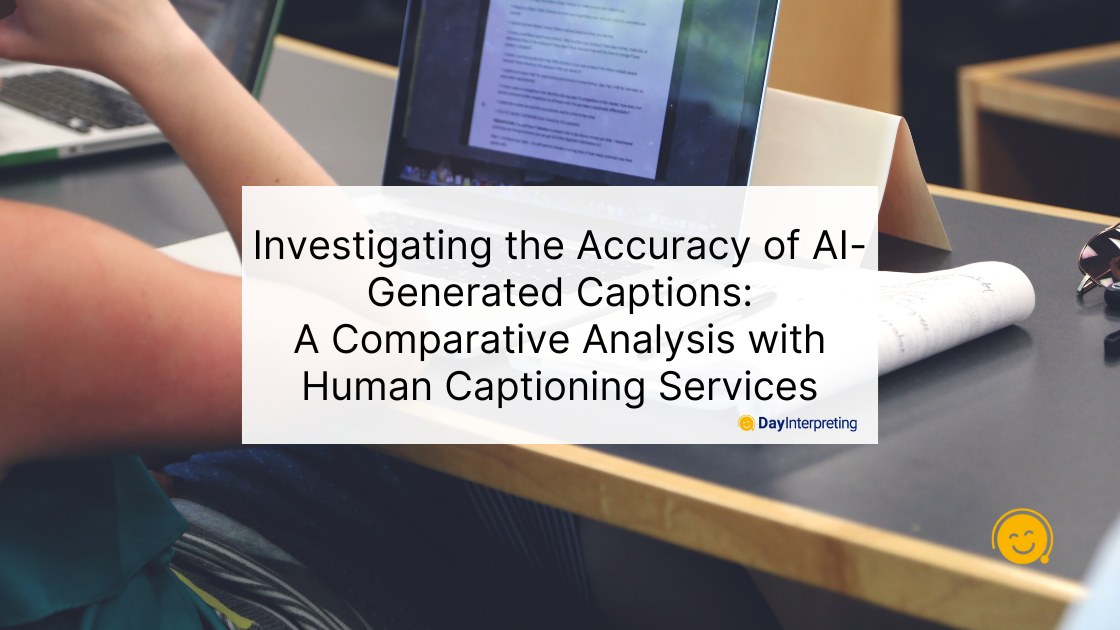The rapid advancements in artificial intelligence (AI) have led to the emergence of various applications across different industries. One such application is AI-generated captions, which play a significant role in enhancing accessibility and user experience, particularly in the field of content creation, video streaming, and social media. These AI captioning services, powered by deep learning algorithms, have become increasingly popular. However, it is essential to investigate their accuracy and compare them to human captioning services. This article delves into the accuracy of AI-generated captions, and highlights why using human professionals is often a superior choice in ensuring accurate interpretation of cultural nuances and avoiding the loss of meaning in translation.
The Rise of AI-Generated Captions
AI-generated captions have become an essential tool for content creators, educators, and media producers. These systems leverage machine learning models, natural language processing, and speech recognition technology to transcribe spoken language into text, facilitating accessibility for individuals with hearing impairments and enhancing SEO for online content.
- Speed and Efficiency: AI-generated captions are known for their incredible speed and efficiency in transcribing audio and video content. They can process large volumes of content in a fraction of the time it would take a human transcriber.
- Cost-Effective: AI captioning services are often more cost-effective than hiring human professionals, especially for organizations with substantial transcription needs.
- Continuous Availability: AI captioning services are available 24/7, making them convenient for live broadcasts, webinars, and any content requiring real-time captions.
The Accuracy of AI-Generated Captions
While AI-generated captions have many advantages, their accuracy remains a concern. AI systems, despite their sophistication, are not infallible, and several factors contribute to their inaccuracies:
- Speech Recognition Challenges: AI captioning systems heavily rely on speech recognition technology, which can falter in the presence of background noise, accents, or multiple speakers. This can lead to mistranscriptions and inaccuracies.
- Lack of Context: AI models often struggle to understand context, humor, sarcasm, or regional colloquialisms, leading to misinterpretations in captions.
- Inability to Recognize Names and Specific Terminology: Proper nouns, technical jargon, and industry-specific terminology may be incorrectly transcribed, diminishing the quality of the captions.
- Cultural Nuances: AI systems do not possess the cultural awareness and sensitivity required to accurately interpret cultural nuances, potentially leading to misunderstandings or misrepresentations in captions.
The Role of Human Captioning Services
In contrast to AI-generated captions, human captioning services offer several advantages in terms of accuracy, especially when it comes to content that is culturally or contextually sensitive:
- Cultural Competence: Human captioners can recognize and interpret cultural nuances, idioms, and local expressions that AI systems often overlook.
- Contextual Understanding: Humans are skilled at understanding the context of a conversation, which is crucial for producing accurate and contextually relevant captions.
- Error Correction: Human captioners can cross-verify and correct any inaccuracies in their work, ensuring that the final product is error-free and culturally appropriate.
- Speaker Recognition: Humans are adept at distinguishing between multiple speakers, ensuring that each person’s speech is attributed correctly in the captions.
- Complex Content: Human professionals are better equipped to handle complex content, such as medical or legal documents, where precision and accuracy are paramount.
When to Choose Human Captioning Services
It is crucial to understand that while AI-generated captions have their place, human captioning services are indispensable in certain situations. Here are some scenarios where opting for human captioning services is advisable:
- Content with Cultural Sensitivity: Content that involves cultural nuances, such as documentaries, interviews, or dialogue-heavy scenes, should be captioned by humans to ensure accurate representation.
- Live Broadcasts: Events with real-time speech, especially those featuring multiple speakers, should rely on human captioners to maintain accuracy and clarity.
- Legal and Medical Transcriptions: For legal or medical documents where precision is essential, human captioning services are the preferred choice.
- High-Stakes Communication: In situations where misunderstandings could have serious consequences, such as international negotiations or diplomatic conferences, human professionals are necessary.
Final Thoughts on the Accuracy of AI-Generated Captions
AI-generated captions have undoubtedly revolutionized how we consume and create content, offering efficiency and accessibility benefits. However, it is essential to recognize their limitations, particularly when dealing with culturally sensitive, complex, or high-stakes content. Human captioning services continue to play an irreplaceable role in ensuring the accuracy and contextually appropriate representation of spoken language. As technology advances, striking the right balance between AI and human expertise will be key to delivering the best possible captioning solutions for a diverse and global audience.





0 Comments